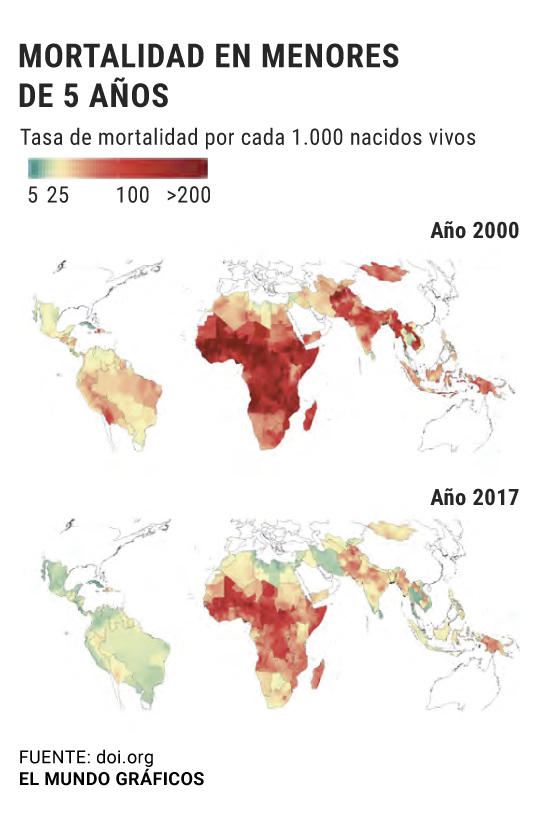- Ethiopia.Technology and support for mothers to fight hunger
Malnutrition is a serious problem, whose effects can compromise the future of people. When this occurs among the child population, its development is affected, subtracting possibilities later in the adult stage . This is one of the main challenges to overcome in the management of refugee camps in Africa, where it is estimated that 80% of the population are women and children.
Caroline Wilkinson has been working for years to reduce the death rate in these settlements. She is a nutrition consultant for UNHCR and president of the United Nations Emergency Nutrition Working Group (SCN), and perhaps one of the world's leading experts in the fight against malnutrition. She is part of the MOM project, an UNHCR initiative in partnership with the 'la Caixa' Foundation that has started in the Gambella and Melkadida refugee camps in Ethiopia and whose main objective is the treatment and prevention of malnutrition in children under 5 years. In 2018, it has managed to reduce acute global malnutrition by more than 43% and has reduced infant mortality by 76% in these places .
Yesterday, precisely, an investigation published in the journal Nature and funded by the Bill and Melinda Gates Foundation revealed that 58% of the 123 million deaths of children under five years of age in the world's poorest countries between 2000 and 2017 could have been prevented.
And for that to happen, Caroline works tirelessly «We try to implement initiatives that we know work. And we do our best to work with the community, empowering women and families, through interventions that are not too expensive, ”he explains.
The fight against anemia
One of the great novelties of this project is the application of new technologies, such as the test of a non-invasive technology to diagnose anemia. "Up to 60% of children suffer from anemia in refugee camps, which compromises their future by affecting their development and detracting them from potential," explains Wilkinson, who points out how the alternatives for measuring so far were costly and painful . "Blood collection is not very acceptable, especially in children as young as two years old, and the pain it causes makes mothers reluctant."
Now, a meter is able to know if a person suffers from anemia simply with a sensor that is placed on the nail and generates a light, which allows the evaluation of hemoglobin levels. " We know that this device works in the laboratory , now the challenge is to see if it can also do it in extreme conditions like those of refugee camps in Ethiopia. And if it does, it is something that we can then use in other situations," Wilkinson explains.
This new meter, in addition to facilitating the control of anemia among the child population, will also allow it to be done in pregnant women or nursing mothers, as well as in populations that until now were not sufficiently evaluated, such as adolescent women. "This is very important because anemia, even when it is mild, has consequences in the short and long term. And when it occurs it is very difficult to do a treatment, since it takes a long time to return to normal," says Wilkinson, who It also affects how anemia increases the risk of mortality after childbirth considerably.
Promote breastfeeding
Anemia is not the only focus of the MOM project. "We often focus on acute malnutrition and forget that there are also problems for growth or micronutrient deficiency." In these cases, breastfeeding is a pillar that should be encouraged. "It is not that culturally they do not understand the importance of this lactation, since the majority comes from societies where their way of life is through grazing and they know the importance of milk in growth, but it has to do with the consequences derived from having to escape conflict zones. "
In this sense, Wilkinson points to time management as the main obstacle for many of the mothers. Their situation forces them to carry out a whole series of complementary activities that do not allow them to properly attend to their children. "If a mother has to spend all day in the market selling tomatoes, she will not be able to breastfeed her child as she should. To fight this it is also important to educate the whole community, not only the woman, so they can help her take these decisions that I couldn't alone. "
More refugees than ever
The MOM project has focused on refugee camps in Ethiopia, but its vocation is to be able to extend to other contexts. "Unfortunately, we live in a time when there are more refugees than ever. Chad, Niger, Burkina Faso, Bangladesh, South Sudan ... This often causes us to be overwhelmed. But even at times like the economic crisis that people lived in Spain, the solidarity of the people was not reduced and this is something positive to highlight. "
Now, thanks to the collaboration of the 'la Caixa' Foundation, it will be possible to evaluate which things have worked and which have not worked in Ethiopia, in order to improve the results. "Until now, our funds only reached us to implement the programs, but this evaluation was lacking , this phase of learning that we can now do and then replicate these results in other places," concludes Caroline Wilkinson.
The United Nations Commissioner for Human Rights and former president of Chile, Michelle Bachelet, puts the focus - in an article that accompanies research in the journal Nature - on the underlying causes of high infant mortality: «Poverty , the lack of empowerment, discrimination and injustice ».
According to the criteria of The Trust Project
Know more
